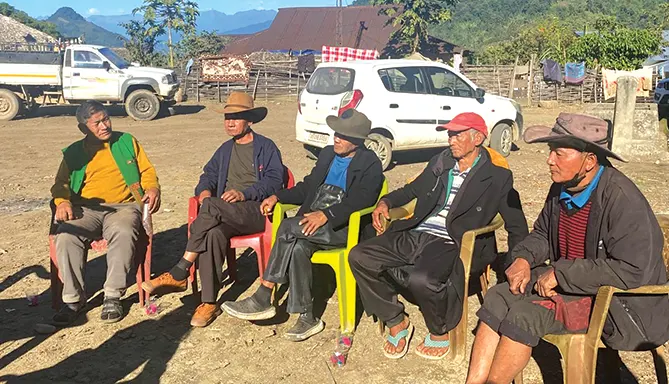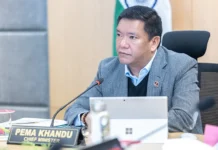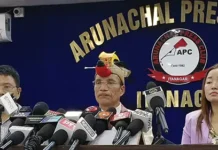
[ Indu Chukhu and Tongam Rina ]
PARONG, SIANG, 17 Dec: After the information that the state government is planning to deploy hundreds of central and state armed police to help the NHPC conduct the pre-feasibility study for the 12,500-megawatt Siang upper multipurpose project (SUMP), there has been an air of anger and apprehension throughout the Siang Valley. Peaceful protests have been held in many villages where the forces were scheduled to be stationed over the past week. While there is no clarity on whether the state government plans to send forces anytime soon, the people remain firm in their opposition to the SUMP.
There are plans for more peaceful protests and local rituals against the proposed project, with a major demonstration scheduled in Komkar on Wednesday, 18 December, and another public gathering planned for the same day in Geku. Villagers spoken to by reporters were clear in their opposition to the project, with gaon buras and buris leading the protests.
Strongly opposing the Siang project, the gaon buras of Riew village have appealed to Chief Minister Pema Khandu not to send any armed personnel to the region as proposed. They argue that since there is no violence in the area, there is absolutely no reason for the government to consider such a move.
Taling Tamuk, a baon bura of Riew village, requested the government not to use force. He said that the people aren’t afraid of the Central Armed Police Force (CAPF). “We have our own rules and customary laws,” he said.
He also warned that if forces are deployed, there will be a possibility of violence.
In Upper Siang’s Geku, one of the gaon buris, Okor Tate, said “We are not terrorists; it is our right to protect our land. It is every Indian’s right to protect the country’s land. It is the farmers’ right to protect our land. CAPF should not be deployed. If there is a dam on our land, where will we go? We will have nothing left.
“It’s not our fault, and we are not terrorists. When we first heard about this order, we were frightened, wondering why the armed police were being sent,” she said.
Osom Taku, one of the gaon buras of Geku village, said that the villagers are opposed to the multipurpose project, and appealed against deployment. Taku said that the government should not use force. He recalled the chief minister’s earlier statement, when Khandu had said that the government would proceed with the construction of dams only if the people agreed, and would not do so if they were unwilling. Taku added, “We will fight for this cause.”
Taga Tamuk, the secretary of Riew village, while opposing the proposed deployment of central and state armed police, said, “We are Indians too. We are not Pakistanis or Chinese.” He further said that the government is imposing the dams on the people by force.
As reported earlier, in a show of strong resistance, the people of Siang Valley have united in peaceful protests, even as the state government attempted to suppress the protests through force and coercion, allegedly under pressure from the central government to counter China’s dam-building activities on the Yarlung Tsangpo in Tibet, which is upstream of the Siang.
In a letter to the deputy commissioners of Upper Siang, East Siang, and Siang districts, the home secretary requested accommodation and logistical support for the deployment of security forces, including women police personnel, by 15 December. In Upper Siang, one company of CAPF was to be deployed in Geku, Uggeng, and Jengging, with women police in Geku and Jengging, and state police in Yingkiong. In Siang district, five companies were planned: two in Begging, two in Parong, and one at the Boleng NHPC office, with state police and women police assigned to various locations, including Boleng HQ, the NHPC office, and Pasighat in East Siang.
While the entire region has seen unprecedented unrest, Chief Minister Pema Khandu and Deputy Chief Minister Chowna Mein are scheduled to visit Boleng on 19 December for the victory celebration of the panchayat and RWD minister.



